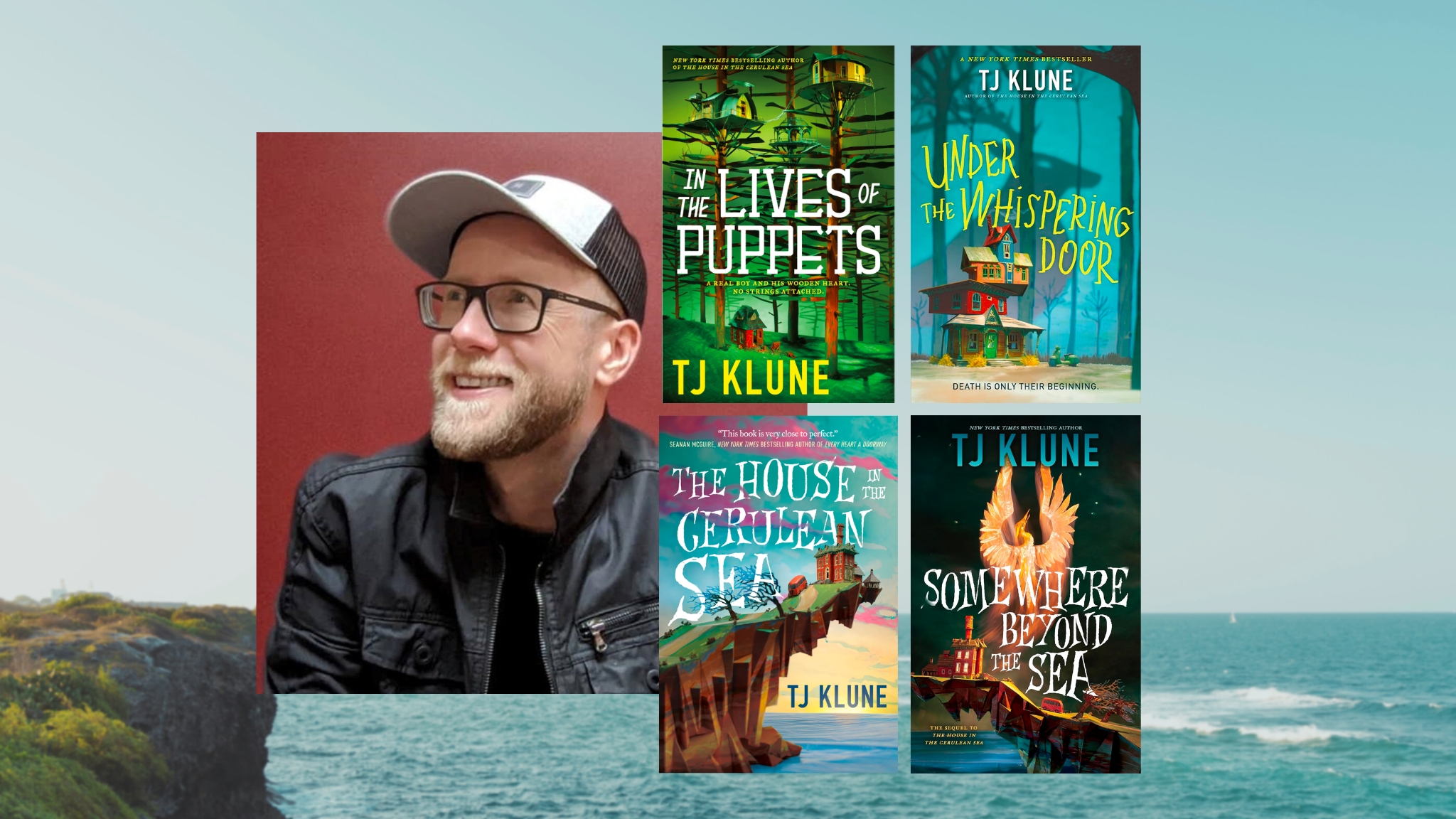T.J. Klune writes moving, whimsical and magical stories. The House on the Cerulean Sea transported readers to a fantasy world, where they could vividly imagine the scenes and learn lessons about family, love and what it means to trust others.
Klune is also known for his other books, such as the YA series, The Extraordinaries, a story about two boys and a world of superheroes. As a queer author, Klune has always championed stories that represent the community and celebrate differences and diversity.
We had a chance to chat with T.J. Klune about the therapeutic effect of writing, the re-release of his fantasy series Wolfsong, and his upcoming projects.
You’re known for adding a dash of kindness and warmth to your characters as they grow throughout the story. Has the process of creating and developing any of your characters taught you important lessons? Do any characters of your own stand out to you as people you’ve learned from?
It has, but in a way, I think it’s more of the wonderfully mortal thing that affects everyone: I’m getting older. I think it’s important for younger people to have, for lack of a better phrase, a bit of a chip on their shoulders. Perhaps a period when cynicism helps to guide through to adulthood and beyond.
I know that’s how it was for me, anyway. But now that I’m older, I’m firm in my beliefs, and know what I stand for. As the adage says, kindness goes a long way. I don’t think I appreciated just how true that is. It’s not necessarily just kindness to everyday things. It’s more of an outlook that is fueled by hope. I know people suck. I see evidence of it every day. But I also see the tiny stories of people doing meaningful things for each other and the world. We often say the world is aflame, but there are good people out there, fighting back the fire.
I suppose, though, that writing the characters I have of late also helps me to realize that there are some things I still need to work on. I’m a work-in-progress, with hopes to get at least a little bit better every day. I’ll never be perfect at anything I do — writing, living, walking (I’m a klutz) — but I’ll try to be better than I was before.
Your novel, House of the Cerulean Sea, leaves readers engaged throughout while teaching important lessons about humanity. Featuring a case worker trying to protect magical children who are deemed dangerous, we learn a lot about what it means to care for others no matter the odds stacked against us. What inspired you to integrate those themes into a story with these particular characters at the helm?
So many people — especially as children — know the feeling of being othered. From my own experience, being a queer kid in rural Oregon in the 90s with undiagnosed ADHD, I know how it feels. It makes you feel so different that you don’t know how to relate to your peers. A lot of it — especially at that time — was a “fake-it-till-you-make-it-the-hell-outta-here” mentality.
No one should ever be made to feel that way, but especially not children. But it does, more than we care to admit, even now. I wrote this book because I wanted those who’ve ever felt othered to know there is so much magic in who they are that it’s undeniable. People won’t always understand; but then it’s not up to you to try and convince them. That’s on them.
You’ve spoken in other interviews about putting a cozy, happy vibe into your fantasy novels, and instilling positive messaging of hope, understanding and comfort. Beyond the outward reception of these messages in your novels, is writing a meditative process for you? Does writing help you explore or process your own experiences?
Oh, definitely. Writing is … well. It’s therapeutic. In a way, you’re all my therapists where I don’t listen to any of your advice. That’s definitely unhealthy.
I write to work through things I want to understand. A big part of my ADHD is hyper-fixation, which means when something piques my interest, I’m pretty much making that my entire life until something else distracts me.
I also write to try and explain things I don’t understand. Grief is one of those things. I wrote Under the Whispering Door to try and figure out that while grief is universal, no two people experience it the same way. I wrote it in the throes of my own grief, trying to find out the why of it all.
On the flipside, the imagination can explode from the most mundane of things. My most recent novel, In the Lives of Puppets — rumination on humanity and forgiveness starring a mostly robotic cast — exists because I bought a Roomba vacuum, so. Brains are weird electric balls of jelly.
The Extraordinaires series mixes the world of fandoms and fan fiction with main character Nick Bell. Nick’s dream of meeting his heroes comes true when he meets Shadow Star and decides that he too can be extraordinary. What inspired you to give voice to a fanboy like Nick, representing people whose interests aren’t quite “mainstream” or conventional?
You know how most authors say they put bits and pieces of themselves in all they write? Yeah, Nick was probably the most I’ve ever done that with. Ostensibly, I am the adult version of Nick, sans powers or the desire to live in a city with more than, say, twenty thousand people.
I never got to see a queer kid with ADHD. I loved comics. When I was a kid, Wolverine made me gay because apparently 12-year-old me liked short, hairy, angry men. I wanted to see that kid as the star of his own book(s). I still read comics, by the way. And I stand by the fact that Wolverine made many queer boys feel things they were not prepared for.
Your characters and stories inspire readers and give people the strength to be brave. Have you had any particularly heartwarming responses to the queer characters, relationships or storylines in your novels?
Too many to count. That sounds like a brag. Maybe it is, I don’t know. What I do know is that it’s not deserved, but appreciated and magnificently humbling all at once.
I think to single out any one story would do a disservice to all the wonderful things I’ve read or been told. However, I will say the response to Under the Whispering Door wasn’t something I expected. In the time since that book was released, I have heard from so many people with their own stories of grief and perseverance. Maybe that’s what I was looking for when I wrote it. Rather than finding out the why, I found that even though it’s different for everyone, the fact remains it is still universal. We all know loss, and there is a shared kinship in that, regardless of where we come from.
This year, there was the re-release of your 2015 Greencreek Series, with stunning new cover art. Wolfsong, the first book, follows the main character Ox as he struggles with his identity and is told by his father that he will amount to nothing. Ox leaves, and as the years progress, he starts a friendship with a boy who has a secret. We follow these characters as they deal with growth, identity and death. Do you think that Ox’s story will be/has been received differently, being re-released nearly a decade after its publication?
Oh, absolutely. It already has in the short weeks it’s already been out. Though I’ve been fortunate enough to have been doing this for a long time and had a pretty amazing readership pre-2020, I know many people discovered me with Cerulean Sea. They’ve had my “Tor Years” to think about the way I write.
And then Wolfsong comes out and punches them in the face.
The things I’ve heard the most can be put into two camps:
- They did not know I could jump on their heart with shoes made of concrete;
- They did not know that I can write explicit anal sex.
Fun!
Your recent novel, In the Lives of Puppets, is a kind of Pinnochio retelling, following an unconventional family that has made a life for themselves hidden away in a forest. One of the strongest themes is found family, something that appears in a number of your books. Tell us a bit about that theme and what it means to you.
I’m so grateful you asked this question! As most readers know, found-family is a pretty big selling point these days, this trope’s turn in the spotlight.
But what I’d like to say about it is this: the trope comes from a very real place. Many queer people never received the love and safety they deserved in their childhoods, and had to go out and make families of their own. Most of these people aren’t related by blood. That’s how it is in my family: a few are related, the others are not.
I write it because I live it every day. And I’m so grateful that so people love these kinds of stories, because I doubt I’ll ever stop.
What books or creative projects are you working on next that you can share with us?
Ravensong releases in August, the second book in the Green Creek series after Wolfsong. It will continue to show why I am an absolute bastard. I love it.
–
TJ Klune has just announced the sequel to The House in the Cerulean Sea, titled Somewhere Beyond the Sea, which will be released in Fall of 2024.
About TJ Klune:
 TJ Klune is the New York Times and USA Today bestselling, Lambda Literary Award–winning author of The House in the Cerulean Sea, Under the Whispering Door, In the Lives of Puppets, the Extraordinaries series for teens, and more. Being queer himself, Klune believes it’s important―now more than ever―to have accurate, positive queer representation in stories.
TJ Klune is the New York Times and USA Today bestselling, Lambda Literary Award–winning author of The House in the Cerulean Sea, Under the Whispering Door, In the Lives of Puppets, the Extraordinaries series for teens, and more. Being queer himself, Klune believes it’s important―now more than ever―to have accurate, positive queer representation in stories.




